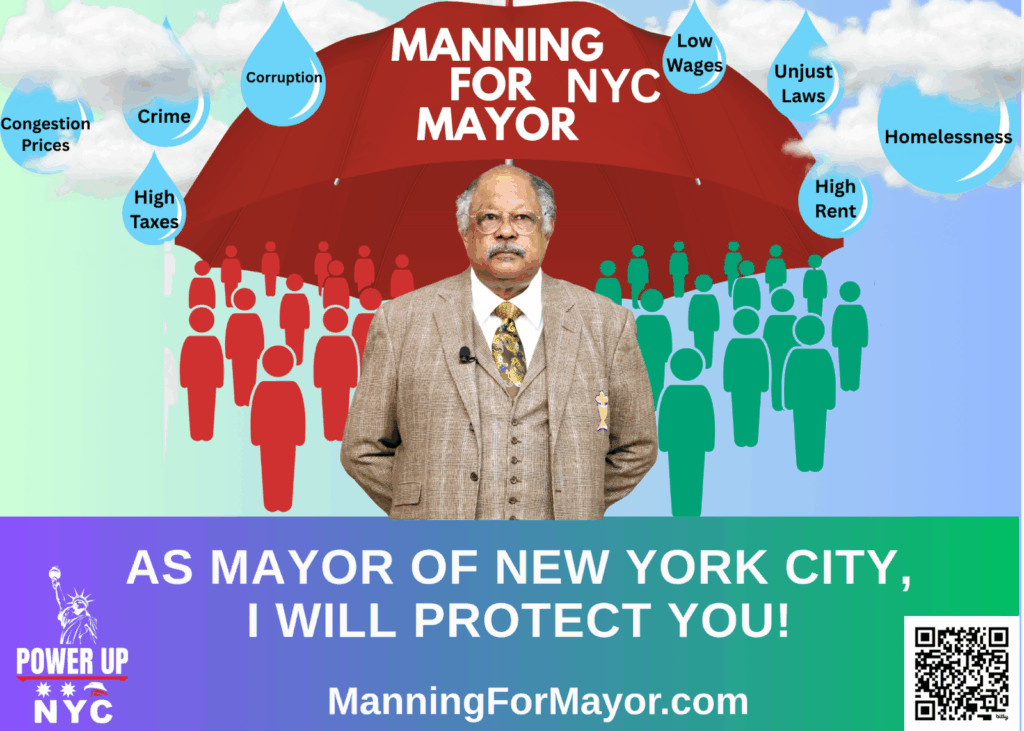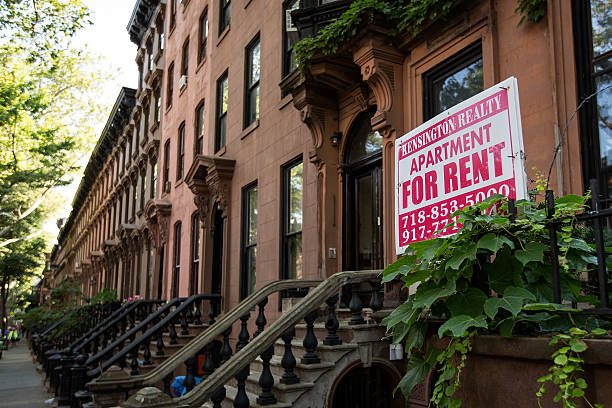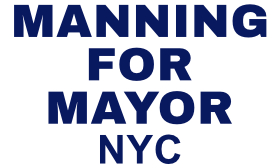Manning #1 Policy: I WILL PROTECT YOU

I am running for NYC Mayor as an independent because among other failed policies the democrats have made LGBTQ the utopia policy. Dems have persecuted me for my freedom of speech and my belief in The Word Of God. Dems and liberals have harassed, threatened, marginalized and labeled me a hate preacher. Jesus did not change the law (Mt. 5:17-19, ) and so the law against sodomy cannot be changed!!!
A Vision for Affordable Living and Fair Wages in New York City
Pastor James David Manning is committed to reducing the cost of living for all New Yorkers and ensuring fair pay for workers. His two-pronged economic policy addresses the urgent challenges of affordability and income inequality, laying the foundation for a more equitable and thriving city.
THE RENT IS TOO DAMN HIGH
All monies saved from homelessness initiative budget (that I will enact/implement) be rebated to New York Family renters who qualify for benefits.
All monies saved from homelessness initiative budget (that I will enact/implement) be rebated to New York Family renters who qualify for benefits.
All monies saved from reduction in crime be rebated to New York Property Tax payers.
No hotel sales or city tax to all New Yorkers.
Congestion Pricing Is Punitive: It Discriminates Against Poor, Working Class, Retirees And Seniors. It must be reviewed for equity or repealed.
Eliminating Taxes on Food
The Right to Affordable Food
Guided by principles like those found in Isaiah 55:1-2, James Manning believes that access to affordable food is a fundamental human right. His plan includes:
- No Taxes on Groceries: Eliminate all sales taxes on essential food items such as fresh produce, dairy, grains, and other staples, reducing costs for families and improving food security.
- No Taxes on Restaurant Meals: Remove taxes on restaurant dining to help families enjoy meals out without financial strain, while also bolstering the local restaurant industry.
- Support for Small Food Stores: In underserved neighborhoods, small stores such as bodegas and delis will no longer have to collect taxes on any items sold, including toiletries and beer, addressing the “food desert” crisis.
This tax relief will:
- Save the average New Yorker $1,200–$1,700 annually.
- Provide families with better access to healthy, high-quality food.
- Increase vendor and supplier profits, reducing the need for food assistance programs.
- Enhance the quality of life in low-income neighborhoods by promoting health and equity.


Raising the Minimum Wage to $27/Hour
The Fight for a Living Wage
James Manning is dedicated to providing all New Yorkers with fair compensation that reflects the city’s high cost of living. His proposal to raise the minimum wage to $27/hour will:
- Increase annual earnings for minimum-wage workers to $56,160, helping lift working-class residents out of poverty.
- Provide financial stability to essential workers in retail, food service, healthcare, and transportation.
- Address disparities in the wage scale, ensuring that all workers receive fair compensation.
The Benefits
- Economic Empowerment: Workers will have greater access to housing, healthcare, and other essentials, reducing poverty and enhancing overall well-being.
- Stronger Communities: Higher wages mean healthier, safer neighborhoods with reduced crime and homelessness.
- Boosted Business Growth: Increased spending power will generate more customers for small and large businesses, stimulating the local economy.
- Price Stability Measures: Legislation will prevent corporations from unjustly raising prices and offer tax breaks for low-income area businesses.
Pastor Manning’s vision is simple yet transformative: combining tax-free food purchases with a $27/hour minimum wage will make daily living costs more manageable for every New Yorker. Families will gain access to healthy meals, businesses will thrive, and working-class residents will achieve financial independence.By reducing hunger, empowering workers, and fostering a vibrant economy, James Manning’s two-pronged plan offers a path toward equity and long-term prosperity for all New Yorkers.
Health for All: Making NYC a Model for Affordable Care
Access to quality healthcare is a fundamental human right, not a privilege reserved for the wealthy. New York City must lead the charge in transforming healthcare from a profit-driven system to a service that prioritizes the well-being of its residents. As mayor, I will champion policies to make healthcare affordable, fair, and accessible for all New Yorkers, drawing inspiration from successful models around the world.
Key Policy Initiatives:
Full Examination of Healthcare Providers
- Order an independent audit of all healthcare providers in NYC to analyze the fairness of their pricing structures, availability of services, and patient outcomes.
- Identify and hold accountable organizations engaging in exploitative practices, including price gouging and unnecessary medical billing.
- Establish a public database to increase transparency around healthcare costs, enabling residents to make informed decisions about their care.
Tackle Healthcare Profiteering
- Advocate for legislation to cap excessive profits in the healthcare industry, ensuring that more resources are reinvested into patient care and community health.
- Form a task force to investigate and dismantle monopolistic practices within the healthcare sector that drive up costs and limit access.
- Promote nonprofit healthcare models that prioritize patients over profits.
Universal Healthcare Model for NYC Residents
- Explore the adoption of successful universal healthcare systems from developed countries, tailoring their principles to meet the needs of NYC residents.
- Work with state and federal governments to pilot a citywide healthcare program providing free or heavily subsidized care for low- and middle-income residents.
- Expand NYC Care to ensure no resident, regardless of immigration status, is left without access to medical services.
Expand Access to Preventive Care
- Invest in community health centers in underserved areas to provide free or low-cost preventive care, including routine check-ups, vaccinations, and mental health services.
- Launch public health campaigns focused on early detection and management of chronic diseases to reduce long-term healthcare costs.
- Partner with schools and workplaces to promote wellness programs that keep New Yorkers healthy.
Address Social Determinants of Health
- Recognize that housing, food security, and economic stability are critical to health. Increase funding for programs that address these root causes of health disparities.
- Create incentives for healthcare providers to integrate social services into their care models, ensuring patients have access to the resources they need to thrive.
Elevating Education, Empowering Communities
As mayor, I believe in the transformative power of education to shape the future of New York City. Our schools must be places where every student, teacher, and staff member thrives. By investing in the people who make education possible, enhancing support for families, and expanding student opportunities, we will build a stronger, more equitable city.
PASTOR MANNING ON EDUCATION
Founded three schools: Great Tomorrows Elementary, Great Tomorrows High School and ATLAH Theological Seminary
THE ATLAH HIGH SCHOOL GRADUATES
I HAVE PERSONALLY SIGNED 500 HIGH SCHOOL STUDENTS GRADUATION CERTIFICATES – Pastor Manning
Deborah Love Smith: Accepted At Yale With Full Scholarship | Graduate Juilliard Masters Degree
Hallelujah Lewis Flannory: Graduate Of Cardozo Law School | Lawyer
Leah Heartfield: Graduate St Johns University Doctorate Degree
Jattira Butler: Graduate St Johns University | Medical Student
Elizabeth Lewis: Graduate NYU Masters Degree
Elizabeth Lewis: Graduate NYU Masters Degree
Elijah Lewis: Berkely College
Key Policy Initiatives:
Greater funding for teachers and special needs students
Introducing the city wide M.A.D.* CURRICULUM
*M.A.D. = Memory, Articulation, Discipline
The entire month of September of each school year will be spent learning M.A.D.
DON’T SAY GAY AND NO TRANSGENDER ZONE
Increase Teacher Pay
- Raise salaries for teachers to reflect their vital role in shaping the city’s future.
- Establish bonuses and loan forgiveness programs for teachers who commit to working in high-need schools for extended periods.
- Provide robust professional development opportunities to ensure teachers stay at the forefront of innovative education practices.
Enhance Pay and Quality of Life for Education Providers and Support Staff
- Increase pay for all school staff, including janitors, food service workers, clerks, and paraprofessionals, to recognize their essential contributions to school operations.
- Improve neighborhood infrastructure around schools by investing in public safety, affordable housing, clean streets, and local businesses to create vibrant, supportive communities for students and staff.
- Expand access to health and wellness programs for school employees to promote work-life balance and job satisfaction.
Uniform Subsidies for Low-Income Families
- Implement subsidies for school uniforms for households earning under $75,000 annually to alleviate financial burdens and promote equity among students.
- Partner with local businesses to offset costs and ensure affordable, high-quality uniforms for all families.
Engage Prominent Business Leaders and Educators
- Launch the “NYC Educators & Innovators Initiative” to encourage business leaders, tech experts, and educators to volunteer time and resources to low-income schools.
- Establish mentorship programs and guest speaker events to expose students to diverse career paths and inspire ambition.
- Provide tax incentives to businesses and individuals who invest time, technology, or funds into public schools.
Global Learning for High School Students in Low-Income Areas
- Introduce legislation to make international travel mandatory for all four years of high school for students in low-income areas.
- Partner with foreign governments, NGOs, and local businesses to fund travel programs, ensuring no financial barriers for students.
- Design curriculum-aligned travel experiences that expose students to global cultures, languages, and industries, preparing them for a competitive global workforce.
Dedicating Those Fallen To The Middle Passage
As mayor of New York City I will enact City, State and Federal legislation to grant ownership of The Adam Clayton Powell Jr State Office Bldg. as a museum- memorial to the souls that perished in the MIDDLE PASSAGE.
Get Onboard With Your Support
Show your support with a donation and let’s make the crooked places straight.

